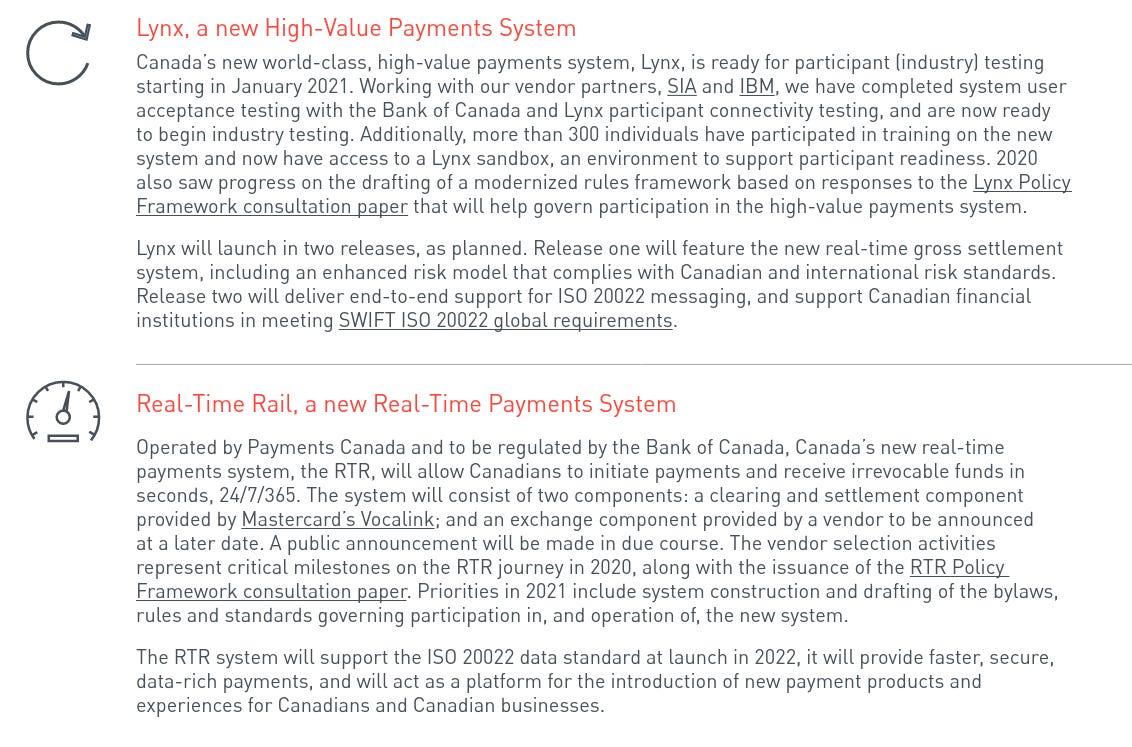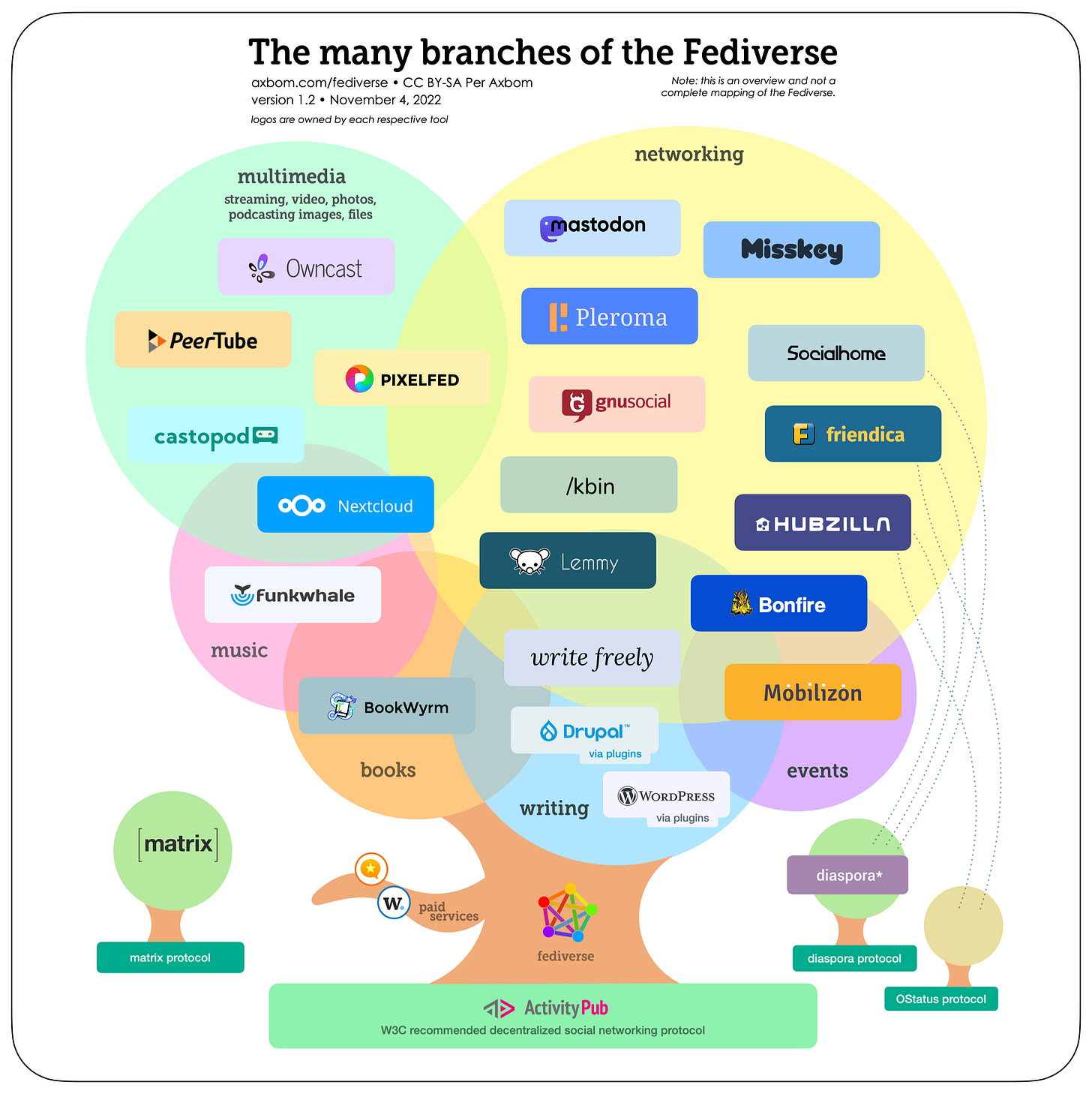November Recap
Website updates, CBDCs, & the Fediverse
Updates
Website https://libresolutions.network
The website is being constantly iteratively improved. A significant goal is to be as independent as possible from specific platforms. In parallel to this, the hugo theme for the website is open source. This means that any features developed are much easier to be used by someone who just wants to get their message out. If you start wanting to steal our features & look, feel free to grab the code!
Now on Tor
Tor Address: http://3vmmhpy7723gkeohqalch5ycesyjl7atnol5jdiqbb55a5be7bcmtrid.onion/
Website audio & video players
Right now the biggest update is the new audio & video elements. What makes them special is that they’re using SVG icons that are automatically styled to respect the global site’s theme. With the magic of CSS media queries they can additionally respect the visitor’s dark/light settings.
Anyone using the theme on their own website will only need to select their colors, then the players will be fully functional and styled.
Voiceovers
I’ve started working on adding voiceovers to the Tools of the Technocracy series as well as other important articles. I’m also using this as an opportunity to improve and update the content. I hope that this will encourage people who wouldn’t otherwise to share and understand the content. !
Not only is the audio also available on the website, the custom player has also been built so that it reverts the regular audio player if you have scripts disabled. (Useful for Tor users)
Other articles with completed voiceovers are:
Audio & Video Podcast
With audio & video content on the website,the theme automatically generates its own RSS feed with the media properly attached.
Screenshots from AntennaPod which is my favorite Podcast App!
Support needed
The Libre Solutions Network was launched with our first post just over a year ago. What a quick year it has been. It has been a very challenging start. There are personal reasons that have made pushing forward regularly quite difficult.
Every bit of support goes a long way to making this project viable. I hope that you find value in the content and insights. I have some long-term plans that I think many of you would find quite interesting.
It means a great deal to me any time someone:
📑 Bookmarks the website
📱 Adds the website feed (https://libresolutions.network/rss) to their favorite podcast app
📣 Shares the content
🗨️ Leaves comments
💰 Becomes a paid subscriber
Independent Web
The decentralized internet isn’t dead, there are many great small websites worth exploring!
Feel free to suggest sites to include posts from!
Blast from the past (2013): Jacob Appelbaum
Important quote: “We need a technical solution and a political solution”
RE: CBDCs: Beyond the basics
James brings some important distinctions to our attention.
There is a difference between retail CBDCs (for you and I) and wholesale CBDCs (for banks)
Not all digital currencies are inherently bad
We should use the good options that are there to liberate marketsHe cautions against being too specific in describing CBDCs because they can take many forms
To go beyond the basics, I will focus on Canada’s situation.
Canada’s digital payment systems
E-transfer
Canada already has a retail digital currency payment system called e-transfer.
An e-transfer is your ability to quickly move bank deposits from one account to another. By associating an e-mail address or a phone number with an account one person can send money to others, or within their own accounts. This system is very accessible for anyone who uses online banking, its existence begs the question: What more do we need?
In the works
The Bank of Canada has published their High-level Strategy of rolling out a CBDC. The following screenshots are from the Modernization Delivery roadmap.
ISO 20022
Retail focused
data rich payments
ISO 20022
Settlement System
This is the wholesale component
What is this ISO 20022?
In short, ISO 20022 is an upgrade to the Swift messaging system.
I can certainly see the benefits in upgrading to a more machine readable format. If you’re interested in going deeper this presentation seems to be a decent starting point.
If there was an overarching plan to implement a total all-invasive social credit system. It would be useful for your brand new data rich payments system(s) to be interoperable with some kind of programmable money.
Response -to criticisms
Some of James’ points apply directly to my piece on CBDCs more directly. Notably, that I hadn’t differentiated between central banks and commercial banks. He correctly points out the push and pull power dynamic between these organizations.
”They all want their slice of the ponzi pie”
I think James over-emphasizes “there are different players with different interests, therefore there is no monolithic conspiracy”. I believe there is an open bid on mass control systems. Yes, massively different players are competing to introduce different systems of control for a seat at the table. This does make them participants in a monolithic conspiracy, and I believe missing that forest for those trees is a mistake.
Baby steps
James attacks use of cash as being “on team commercial bank”. Cash use is consistently cited over and over as one of the primary metrics central banks use to evaluate if the public is ready for a CBDC. In addition to this, I think people undervalue simple, gradual acts of resistance. I worry that a justified sense of urgency is getting the best of many of us.
For example, “De-Googling” your phone does not eliminate all the privacy & security risks inherent in using a smartphone. Instead, the ideal solution involves people creating and sharing entirely new hardware to fill the purposes that smartphones use. This does not mean that De-Googling is useless. There is value in people learning about problems and applying gradual steps towards reclaiming their autonomy. For those who aren’t familiar with the process of installing new operating systems on devices, experiencing it first-hand is a game-changer.
I see using cash in very much the same way. When someone is so entrapped in these systems of control it’s difficult to know where to start. There are many people who are only beginning to understand what is wrong with many of these systems. People are still clinging to the idea that Twitter is going to all-of-a-sudden become a free-and-fair public square.
With that out of the way, I’d highly recommend listening to Survival Currency on the Corbett Report. He rightfully points out the following:
Community is the bedrock.
Almost every novel solution requires people to be involved.Action, is worth all the words in the world.
It’s one thing to have a great idea, but it’s pointless if it can’t be put into place.There is no silver bullet.
Try to be flexible, different people are going to be in very different circumstances and have different constraints. You can’t rely on everyone fitting into a highly constrained model.
This is a big reason I’m a large fan of The Global Walkout.
They outline many steps a totally isolated mainstream person could take to gradually walk away from the problems, and re-connect with their community.
News roundup
🚨 Leaked Documents Outline DHS’s Plans to Police Disinformation
🚨 Tax Filing Websites Have Been Sending Users’ Financial Information to Facebook
🚨 Apple Is Tracking You Even When Its Own Privacy Settings Say It’s Not, New Research Says
🚨 Beyond Censorship: Destroying Dissenters Through Cyberwarfare
⚠️ Don’t record your social life on an append-only social network
ℹ️ Why curation and decentralization is better than millions of apps
⚖️ Open Letter: The universal right to install any software on any device
🇨🇦 Canada’s Bill C-11 explained: A chilling law that lets the government censor user-generated content
Roundup: Contextualizing the evils of our time
It’s very easy to get “lost in the weeds” on any particular aspect of the agendas working against people. I believe that with a useful broad view of the problem, people can respond better in every individual context.
Roundup: Joining the Fediverse
One of the easiest ways to reduce your vulnerability to algorithmically controlled social media is to switch to alternatives with no such filtering mechanisms. The Fediverse has many incredible advantages such as being able to self-host your own server.
Why I left algorithm-based social media and what happened next
A beginner’s guide to Mastodon, the open source Twitter alternative
Privacy Update: What joining Mastodon means for your privacy and security
If you’re on the fediverse, feel free to follow us at @lsn@mk.gabe.rocks
If you’re not sure what instance to join, tell me what you’re interested in the comments!
Roundup: Taking Action
Planned for December
🎙️ Additional voiceovers and new content
🖥️ A review of EmbassyOS
❔ A brand-new action oriented initiative






















Need you and Catherine Austin Fitts and Ed Dowd in a room together, maybe via CHD?😉
Thank you for including my post! I'm going to delve into your cbdc post and the one you recommend now!